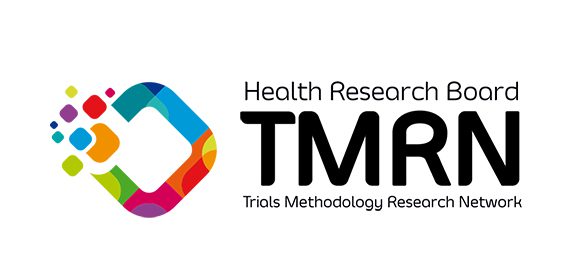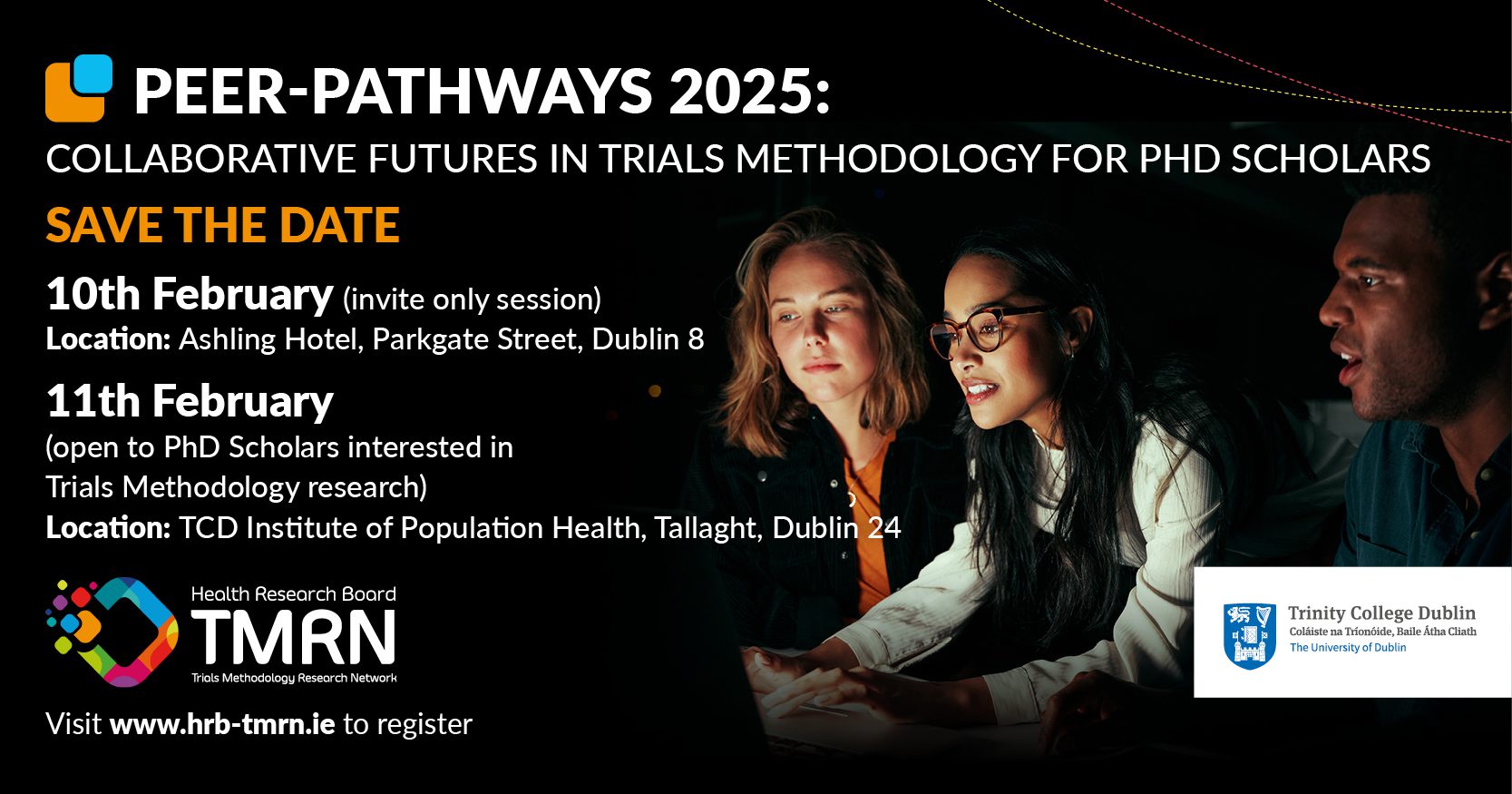Upcoming Events
The HRB-TMRN delivers two streams of training nationally across the areas of Trials Methodology and Trials Essentials. Training is delivered both in-person and online, in the format of webinars / seminars, workshops, study days, short courses and Symposia. We welcome feedback from our attendees at every event, to help shape the training we offer.
november 2024
Event Details
Click here to register. Katie Biggs Population Health, School of Medicine and Population Health, CTRU Assistant Director https://www.sheffield.ac.uk/smph/katie-biggs Katie Biggs is an Assistant Director of
Event Details
Click here to register.


Population Health, School of Medicine and Population Health, CTRU Assistant Director
https://www.sheffield.ac.uk/smph/katie-biggs
Katie Biggs is an Assistant Director of Sheffield Clinical Trials Research Unit (CTRU), a proposal developer and Research Inclusion lead for the NIHR Research Support Service (RSS) Hub delivered by York and partners. Katie is interested in making trials more inclusive, she co-leads the Trial Methodology Research Partnership (TMRP) trial conduct inclusion working group and worked on the INCLUDE socioeconomic disadvantage framework.
Katie led the ACCESS project, which developed guidance for trialists to design more inclusive trials – STEP UP – https://step-up-clinical-trials.co.uk. This webinar will present the ACCESS project, and the key recommendations from the STEP UP guidance, and would be of interest to anyone involved in the design and conduct of clinical trials.


more
Time
(Thursday) 12:00 pm – 1:00 pm
14nov10:00 am4:00 pmCore Outcome Set Training workshopTrinity College Dublin


Event Details
To register, click here Contact us at hrb-tmrn@universityofgalway.ie for
Event Details
more
Time
(Thursday) 10:00 am – 4:00 pm
Organizer
21nov(nov 21)9:15 am22(nov 22)5:00 pmEdinburgh Clinical Trial Management Course (ECTMC)
Event Details
Dates: 21st & 22nd November Time: 09:15-17:00 Location: John McIntyre Conference Centre, Edinburgh This course has been running for more than two decades, in order
Event Details
Dates: 21st & 22nd November
Time: 09:15-17:00
Location: John McIntyre Conference Centre, Edinburgh
This course has been running for more than two decades, in order to support the professional development of anyone involved or interested in clinical trial management, including Trial Management Support Officers (TMSO), Assistant Trial Managers (ATMs), Trial Managers (TMs), Senior Trial Managers (STMs) and related roles.
The aims of the course are:
- To develop attendees’ knowledge and skills in clinical trial management.
- To improve attendees’ understanding of related disciplines including research governance, regulation, trial methodology, data management, monitoring, and project management, with a view to effective teamworking.
- In 2024, there will be a particular focus on patient and public involvement and engagement (PPIE) in trials, efficiency in trial conduct, trial manager career progression, participant diversity, and sustainability in trial conduct.
The course consists of a variety of workshops, practical tasks and lectures. Several interactive sessions cover key topics associated with setting up and delivering clinical trials. Sessions provide practical guidance and facilitate discussion, information exchange and provide plenty of networking opportunities adjacent to Arthur’s Seat, a mountain in the heart of Edinburgh.
The course is co-delivered by The Universities of Edinburgh and Aberdeen.
The three gold threads of the course in 2024 are:
- Involving the right people in design, including patients
- Efficient design
- Sustainability
Cost:
- NHS/Academic rate = £550
- Optional course dinner (21 Nov 2024) = £35
- Industry rate (inc dinner) = £985
Register at https://edin.ac/4c7WJ9N
Click here for more information
more
Time
21 (Thursday) 9:15 am – 22 (Friday) 5:00 pm
Organizer
29nov9:00 am4:30 pmWinter School – Innovations in Cancer Trials MethodologyUniversity of Limerick
Event Details
Click here to register. Contact us at hrb-tmrn@universityofgalway.ie for more information
Event Details
more
Time
(Friday) 9:00 am – 4:30 pm
december 2024
Event Details
Interactive One-Day Workshop Click here to Register Participants can anticipate an informative and practical event that will equipping them with the tools to calculate sample size and
Event Details
Interactive One-Day Workshop
Click here to Register
Participants can anticipate an informative and practical event that will equipping them with the tools to calculate sample size and assess study power, and an understanding that will help them navigate the intricacies of clinical trial planning and analysis.
A comprehensive overview of key steps in the process will be discussed, rationale explained, and several worked examples provided. Attendees will gain insights into techniques for obtaining or estimating effect size, a primary determinant of a required sample size. PI experience, common pitfalls and challenges will be discussed in a panel discussion.
Study day will end with a Statistics Clinic – you can bring your own problem to be discussed with a statistician (please email brief description in advance).
This Study Day is tailored for clinicians, students, researchers, and professionals involved in clinical trial design, conduct and analysis, with no or intermediate level of experience with statistical planning.
Contact us at hrb-tmrn@universityofgalway.ie for more information
more
Time
(Wednesday) 10:00 am – 4:00 pm
Organizer
12dec2:00 pm5:00 pmA Decade of Impact: Celebrating Our JourneyUniversity of Galway
Event Details
Click here to register – Free event Contact us at hrb-tmrn@universityofgalway.ie for more information Venue: MRA201 The Ryan Institute Lecture Theatre, The Ryan
Event Details
Click here to register – Free event
Contact us at hrb-tmrn@universityofgalway.ie for more information
Venue: MRA201 The Ryan Institute Lecture Theatre, The Ryan Institute, University of Galway
more
Time
(Thursday) 2:00 pm – 5:00 pm
Location
MRA201 The Ryan Institute Lecture Theatre, The Ryan Institute, University of Galway
february 2025
Event Details
Registration is now open – Click here. This event will require a fully refundable registration deposit of €20. This is so we
Event Details


Registration is now open – Click here.
This event will require a fully refundable registration deposit of €20. This is so we can reduce waste and cover unnecessary costs. Attendees will be refunded on arrival through Eventbrite. Please note: Refunds on Eventbrite typically take 5 to 7 business days to process.
more
Time
10 (Monday) 10:00 am – 11 (Tuesday) 5:00 pm
Location
Trinity College Dublin
Organizer
april 2025
10apr9:00 am5:00 pmRare Disease Research Conference 2025University College Dublin
Event Details
Event Details


Time
(Thursday) 9:00 am – 5:00 pm
Location
O'Reilly Hall, UCD, Belfield, Dublin 4
Organizer


Rare Disease Clinical Trial Network Ireland
We are a Health Research Board (HRB) – funded network aiming to increase activity in rare disease clinical trials in Ireland. Through collaboration with patients, researchers and industry, we support development of rare disease clinical trials, trial methodology and researcher training, while keeping the patient voice at the centre of everything we do.
june 2025
Accessibility and Complimentary Places
We aim to make our events accessible to everyone. If the cost of attendance is a barrier for you, please contact us as we can offer complimentary places under certain conditions. This includes:
- Members of the public, patients, or carers not affiliated with or supported by an organisation.
- Unemployed individuals and those fully retired.
- Individuals from low to middle-income countries (for online workshops only)
Please note that concessions are not available for businesses, individuals funded by an organization, or large companies.
For more details, please email us at hrb-tmrn@universityofgalway.ie.
Our Network operates across five University Partners,
each leading the way in trials methodology research and training















